Compliance training teaches employees the ethical practices, laws, policies, and regulations that apply to their jobs and industries.
This training encompasses standard courses like sexual harassment prevention training, employment law for managers, workplace diversity training, and occupational safety laws, like OSHA. It also covers specialized compliance-based topics like financial compliance for the banking industry and HIPAA for medical professionals.
Not only does this training ensure that employees understand and adhere to legal and regulatory policies, but it also helps create a culture of accountability and ethics in the workplace.
Because many organizations have to offer compliance training to all new hires, it’s generally much more efficient to use a learning management system (LMS) to train them, rather than scheduling in-person 1-on-1 training sessions every time the organization onboards a new employee.
Skip ahead:
Introduction to compliance training LMS
How to choose the right compliance training LMS
Implementing and using a compliance training LMS Effectively
The future of compliance training LMS
Choose the right compliance training LMS for your business
Introduction to compliance training LMS
A compliance training LMS is software that helps business people create, deliver, and manage compliance training programs. This web-based technology facilitates online training, stores learning data, and tracks student progress.
A good compliance training LMS:
- Ensures that organizations can create and deliver high-quality compliance courses to employees
- Streamlines the process of delivering compliance training by keeping an archive of compliance courses and training materials in one place, so trainers and employees can access them easily
- Makes training accessible to all employees through a combination of video conferencing and face-to-face training, i.e. blended learning
- Maintains an extensive audit trail of learner records, course participation and engagement levels, and assessment results
- Allows organizations to hand out customized certificates after learners have completed a compliance course
Top compliance training LMS
Here are 10 of the best compliance training LMS that’ll help you create and deliver high-quality and effective training programs to your employees:
Thinkific Plus
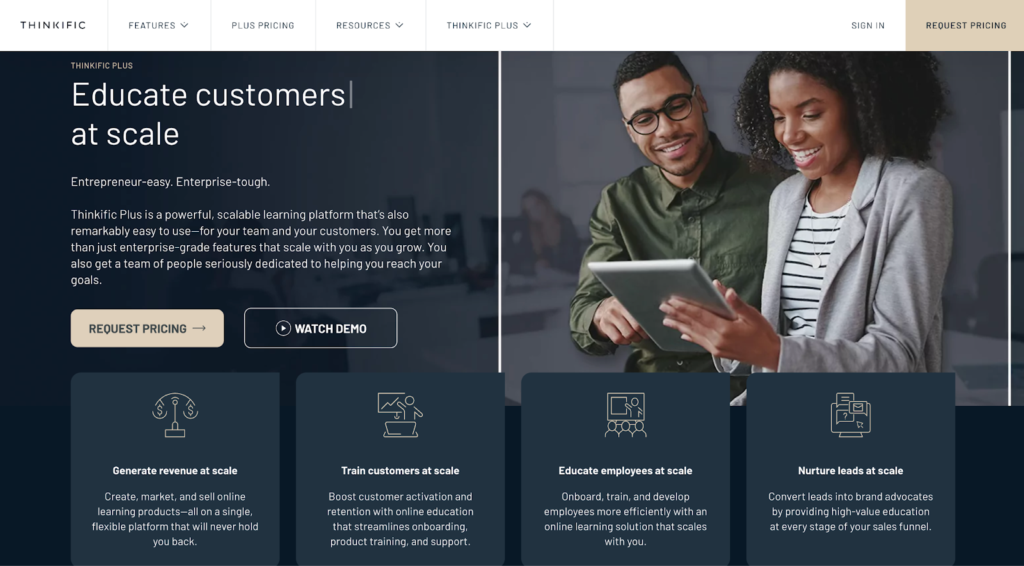
Thinkific Plus is a powerful learning platform with scalable, enterprise-level features that help businesses onboard, develop, and train their workforce (and customers). This platform is designed to be user-friendly and flexible enough to replace traditional classroom training without compromising on quality and employee experience.
With Thinkific Plus, you can create and share everything from live videos to infographics with your employees. You can also incorporate assignments, quizzes, exams, and certificates to measure employee progress.
On the flip side, employees can choose how they want to learn compliance laws and regulations — on their own, with their peers, or a blend of both methods. They can also learn from anywhere and at any time through Thinkific Plus’ mobile app.
Thinkific Plus seamlessly integrates with thousands of other marketing, automation, and employee success tools you may use, so you don’t have to worry about your tech stack being disjointed. And if you run into any technical problems, there’s a team of experts who are ready to help you navigate those issues and create the most effective compliance training program (or any other program you may want to set up).
Key features
- Course Builder
- Assessments and quizzes Advanced CSS customization
- Dedicated mobile app
- Single Sign-On OpenID (SSO)
- Third-party app integrations
- Advanced security features
- Enterprise API access
- Custom migration planning
- Dedicated customer success team
- Certifications
Pricing: Contact Thinkific Plus for a custom quote.
TalentLMS
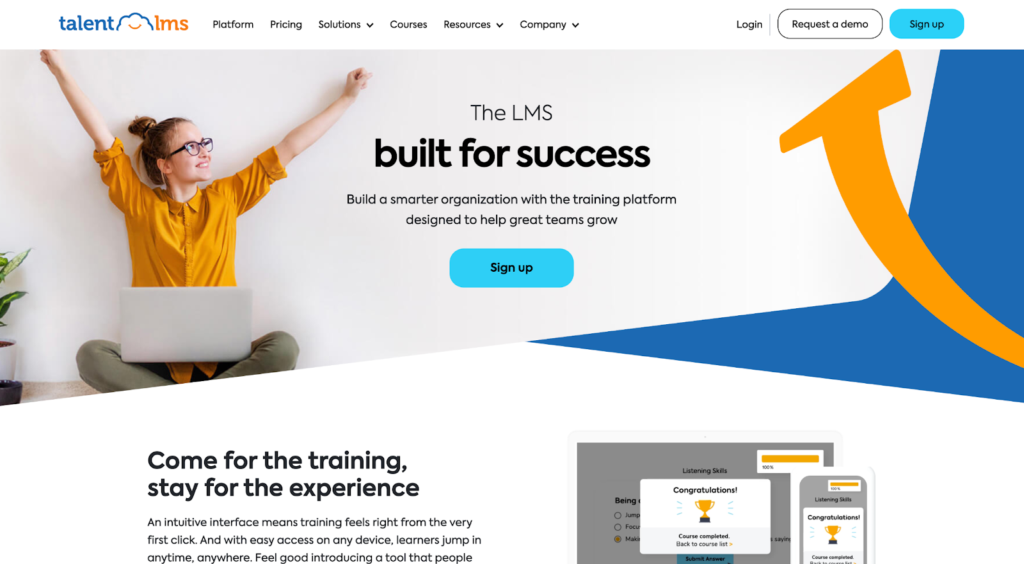
TalentLMS is a cloud-based learning management system that helps organizations of all sizes create online courses, seminars, webinars, and other training programs for their employees. This platform offers robust course creation tools that are flexible enough to cater to different kinds of training, including compliance training, employee training, sales training, customer training, and onboarding training.
While TalentLMS has a ton of great features, what sets it apart from competitors is its conferencing features and gaming elements that promote collaboration and create a more engaging learning experience for your employees. What’s more, TalentLMS is mobile-responsive, so your learners can access the compliance training program whenever they want, no matter where they are.
Key features
- Simple content builder for creating and updating courses
- Ready-made compliance-based courses
- Customizable certifications
- Data import/export
- Extensive tracking and reporting tools
- Web conference
- Third-party integrations
Pricing: Free plan available. Paid plans range from $69/month to $649/month. You can also contact the company for a custom quote.
Coassemble
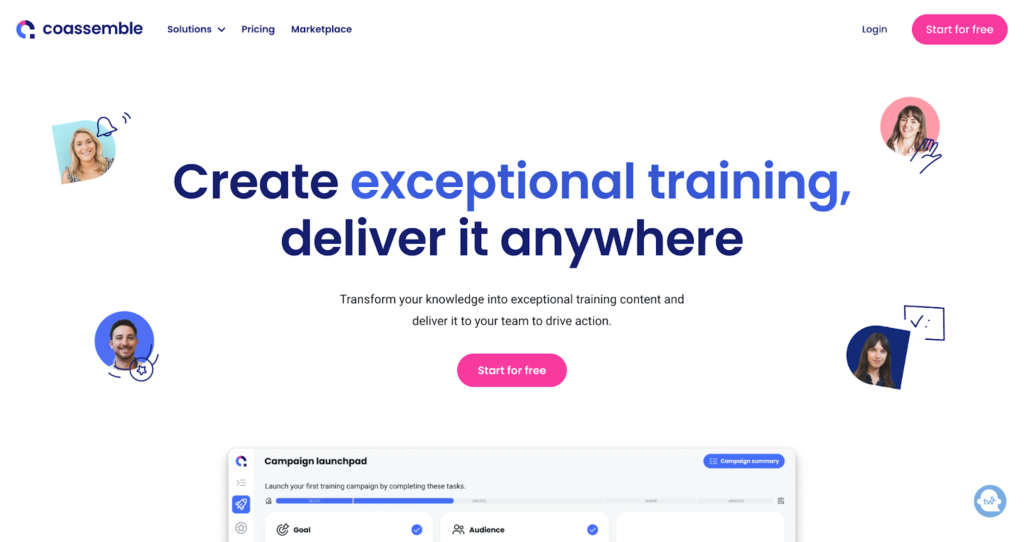
Coassemble is a LMS designed to allow organizations to easily create, deliver, and manage online training campaigns. These campaigns aren’t limited to compliance training; you can also use Coassemble to host team, product, and onboarding training programs.
Coassemble offers users the chance to create unlimited content through dozens of customizable and interactive drag-and-drop templates. These templates — and the courses created with them — are responsive on any device, and Coassemble allows you to update and edit your content in real time from anywhere. There are also advanced analytics that give real-time insights into employee engagement and performance during the program.
Coassemble also integrates smoothly with popular CRM, communication, email marketing, online payment, social media, and eCommerce platforms.
Key features
- 40+ customizable course templates
- Interactive assessments and quizzes
- Custom branding
- Compliance mapping
- Advanced analytics and real-time reporting
- VIP support
- SCORM file reporting
- Zapier integrations
Pricing: Free trial. Paid plan starts at $50/month.
iSpring Learn
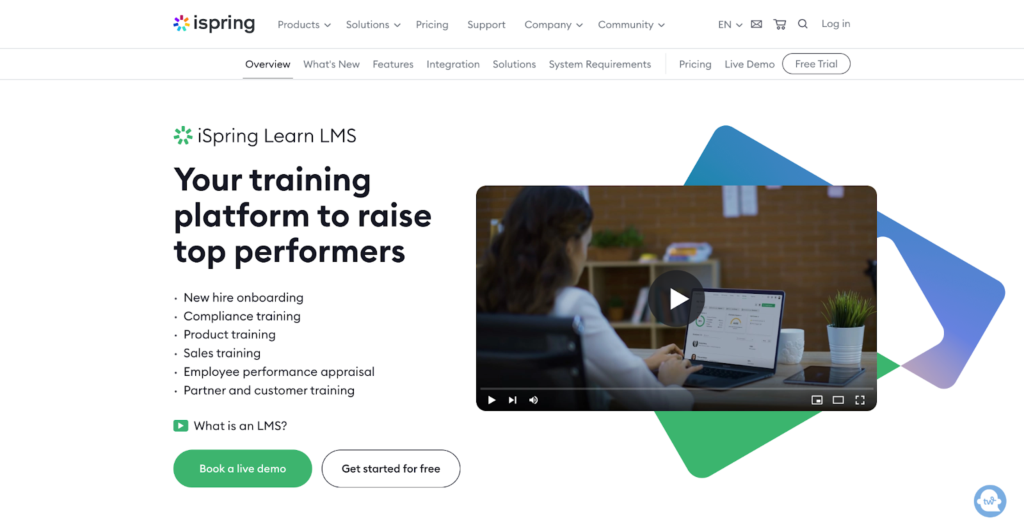
iSpring Learn LMS is an out-of-the-box solution that helps people who have little to no technical knowledge create, launch, and host e-learning content. This user-friendly tool allows users to upload their training materials, release them to students, and monitor learners’ progress, in a short amount of time.
For employees who prefer blended learning, this platform allows them to organize their live training and webinars all in one place. You can also send your students notifications and reminders to ensure that they don’t miss any training.
iSpring Learn has apps for both Android and iOS devices, so students can access their courses from any device at any time, even when they’re offline or on the go.
Key features
- Course builder
- Assessments
- Completion tracking
- In-depth reporting
- Automatic notifications and reminders
- Gaming elements, including points, badges, and leaderboards
- URL customization
Pricing: Paid plans range from $470/author/year to $970/author/year.
Docebo
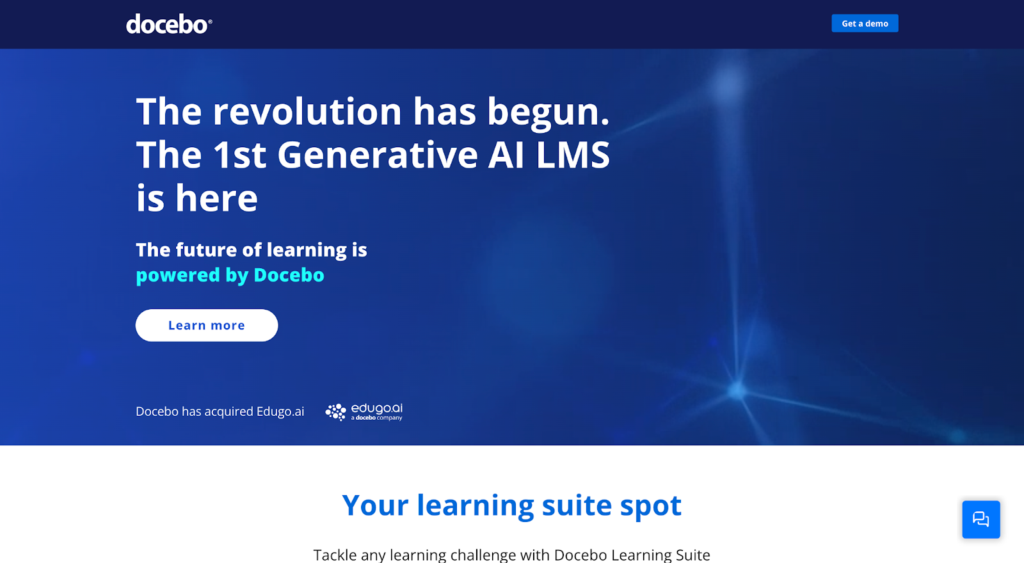
Docebo is an AI-powered learning platform that helps corporations and enterprises create personalized and engaging learning experiences for their employees, automate learning management, and produce outstanding outcomes that align with company goals.
Docebo has powerful learning features that allow you, the user, to deliver accessible compliance training programs in real time in different formats and languages. This tool also automates workflows, which allows you to manage certifications easily and offer new courses on time across any location.
What’s more, Docebo allows you to use gamification and micro-learning to personalize your training programs — which keeps learners engaged, boosts course completion rates, and increases retention.
Key features
- Course catalog
- Custom domain
- eCommerce
- Gamification
- Notifications and reminders
- Certification and retraining
- 400+ third-party integrations
Pricing: Contact the company for a custom quote.
LearnUpon LMS
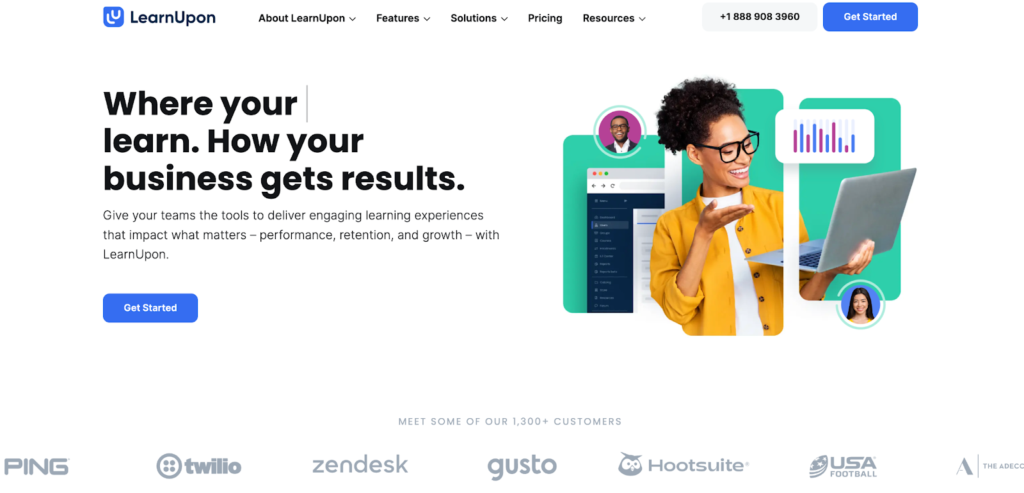
LearnUpon is an LMS that is designed to help large organizations keep their employees, customers, and partners up-to-date on necessary information. In addition to compliance training, you can use LearnUpon to deliver course content on onboarding and skill development to your employees.
LearnUpon allows you to automate how you enroll learners into courses, which cuts down admin workload and gives you time to focus on creating quality content. You can also curate a catalog of compliance-based courses (or courses on any topic) so that employees can self-enroll.
To ease your workload even further, LearnUpon allows you to build an assessment and certification engine that automatically enrolls, tests, and certifies employees once they’re done with the training.
Key features
- Multilingual interface
- Gamification
- Automatic certifications
- Automation of repetitive tasks
- Discussion forums
- 24/7 support
Pricing: Contact the company for a custom quote.
EdApp
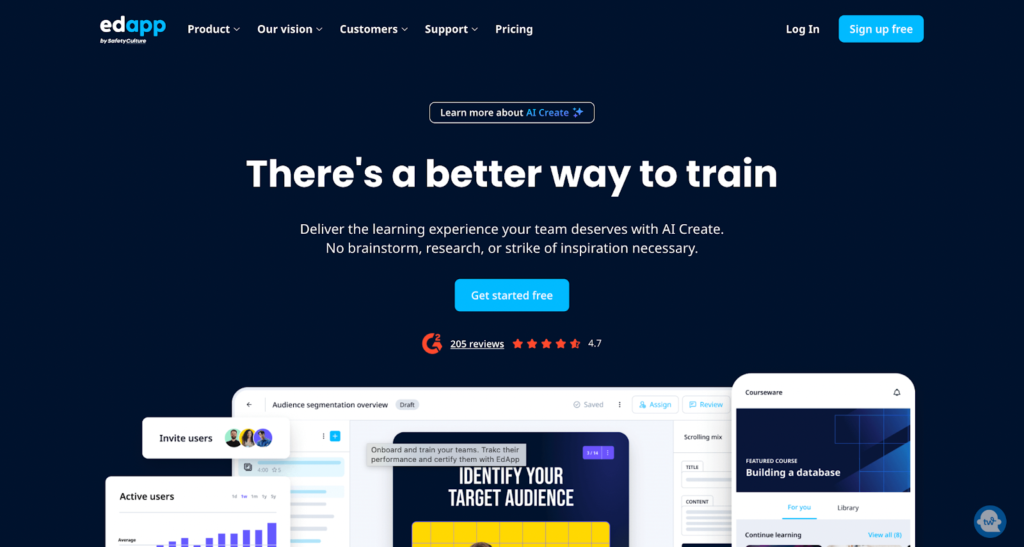
EdApp is a robust LMS designed to help companies create and deliver microlessons directly to students. Although EdApp is described as a mobile LMS, it doesn’t only work on smartphones; learners can take lessons on EdApp with any device they choose.
EdApp has a built-in authoring tool that allows organizations to create compliance-based microlessons from scratch for their employees. It also offers gamification elements, which make these lessons fun and engaging for students. These microlessons, coupled with gamification, make compliance training easier for employees with short attention spans or learning difficulties.
Key features
- Editable course library
- Mobile-first learning
- Gamification
- In-depth reporting and analytics
- Translation capabilities
- Built-in discussion forum
- Video conferencing
Pricing: Free plan available. Paid plans range from $2.95/active user/month to $5.95/active user/month. Contact the company for a custom quote if you’ll have over 500 active users.
Tovuti LMS
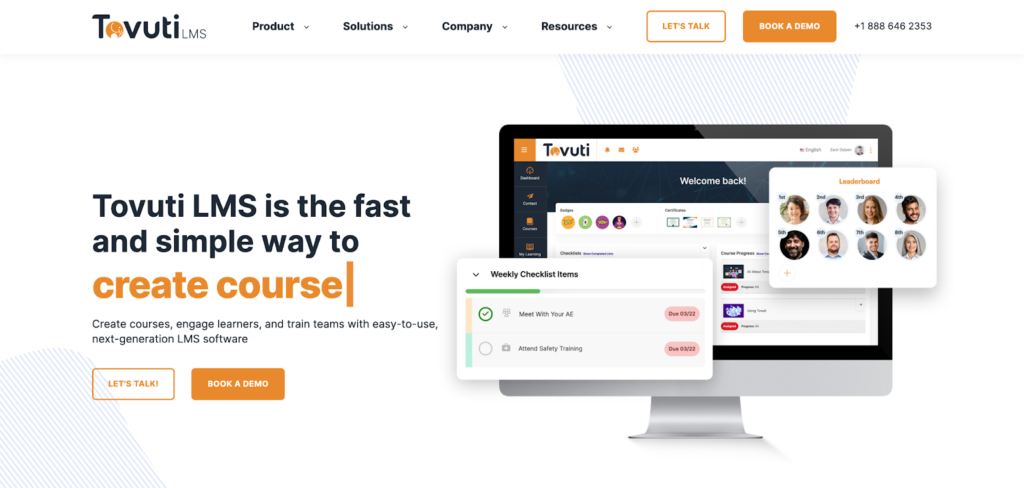
Tovuti is an all-in-one cloud-based LMS that allows businesses to create, manage, and sell training content. In addition to the standard LMS features like course creation and progress monitoring, this platform also offers an eCommerce tool where businesses and teams can monetize and manage purchases/subscriptions of their courses.
Tovuti also has an event management feature that allows businesses to organize live training sessions, and track registration, attendance, and admission charges.
Key features
- Visual content editor
- Built-in course libraries and media
- Collaborative learning
- Gamified learning
- White label and course branding
- Detailed analytics and reports
- Mobile-responsive design
- Language localization to cater to a worldwide audience
- Automatic notifications and reminders
- 2,000+ API integrations
Pricing: Contact the company for a custom quote.
Moodle
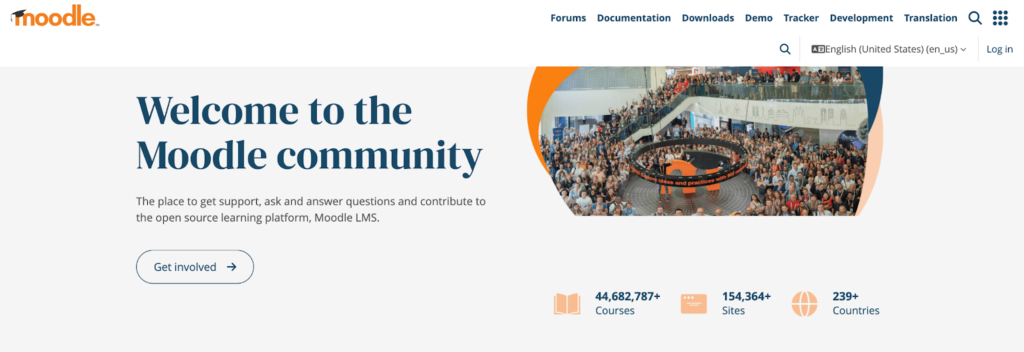
Moodle is an open-source learning platform that allows organizations to make their own custom portal filled with different compliance-based courses their employees can take. This platform prides itself on providing a large set of learner-centric tools and a collaborative learning environment that increases the effectiveness of the teaching and learning process.
The Moodle platform is supported by an active global community, a team of full-time developers, and certified Moodle partners who constantly analyze and update the platform to align with the ever-evolving preferences of its large user base.
Key features
- Bulk course creation
- Customizable site design and layout
- Collaborative tools
- Peer and self-assessment
- Personalized dashboard
- Multilingual capability (100+ language translations)
- Secure authentication and mass enrollment
Pricing: Free
Absorb LMS
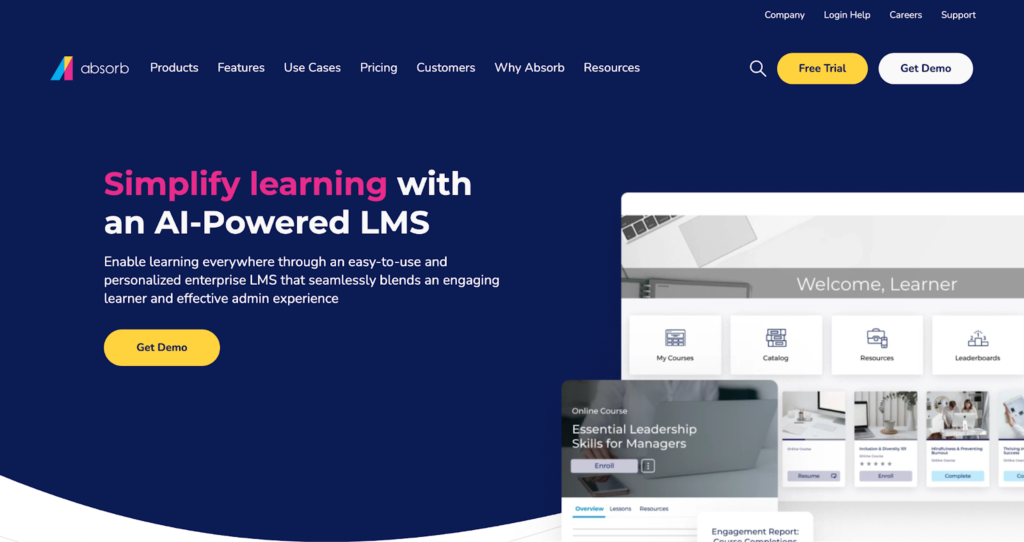
Absorb LMS is a flexible learning platform that provides your business with core features that give you full agency over the creation and management of training programs for internal (and external) stakeholders.
With this learning solution, you don’t need to create courses from scratch; there are pre-created courses you can deploy immediately to your employees. Since Absorb LMS is a learner-first program, you can tailor the learning experience according to business unit, geographic location, and other parameters that apply to your employees.
Absorb LMS helps you maximize efficiency by automating repetitive tasks, so you can focus on interacting with your students more. And if you want to monetize your courses, this platform has an eCommerce module that allows you to manage the courses you sell — from pricing to discounts to sales tax.
Key features
- Built-in course authoring
- Content libraries
- Social learning options
- eCommerce module
- Gamification elements
- AICC/SCORM support
- Automated custom reporting
- Automated certification management
- 20+ languages supported
- 70+ payment gateways
Pricing: Contact the company for a custom quote.
How to choose the right compliance training LMS
There are hundreds of LMS solutions on the market so choosing the best one can be tricky. However, there are certain things you should look out for when selecting a compliance training LMS for your business:
Ease of use
When choosing a compliance training LMS, try to scope out how difficult it is to set up. You don’t want to have to scour forums or watch hours of YouTube videos just to get a basic idea of how it works. Instead, look for an LMS that has a user-friendly interface and features that are easy to understand. This will make it easier for you to create and deliver your training programs.
Built-in training modules
There are many types of compliance courses you can offer employees in different industries — from sexual harassment laws to OSHA to HIPAA. And each course has to be tailored to your preference and style. So instead of starting from scratch each time you want to create a course, choose an LMS that has ready-made training modules. All you have to do is tweak the design, maybe add some more personalized information, and you’re good to go.
Customization features
Tthe compliance training software you use should allow you to customize and tailor it to your specific needs. This includes courses, certificates, notifications, and reminders, among other things. It should also have branding options that allow you to design courses to have your brand logo, colors, and identity on them.
Training assessment features
Ensure that the LMS you’re considering has features that allow you to assess how your employees are progressing with their training. These features usually include quizzes, scorecards, surveys, and presentations that test your learners’ knowledge of the subject matter.
Device compatibility
A good compliance training LMS should be accessible on all major devices, including mobile phones, tablets, desktops, and laptops. This helps students learn on whatever device they own, wherever they are.
In-depth reporting and analytics
In-depth reporting and analytics features are one of the most important things a compliance training LMS should have because it gathers data on learners’ progress, and helps you identify knowledge gaps and monitor milestones. That way, you know what’s going on with your learners and can identify ways to better help them.
Third-party integrations
An LMS for compliance training should integrate smoothly with other systems and tools your organization uses, such as ERP and HR tools. This allows an easy flow of data and streamlines compliance management.
Excellent customer support
Just as with any other tool, you may run into problems when using a compliance training LMS. Should this happen, you want a customer support team ready to assist you through training, providing helpful resources, technical assistance, and troubleshooting.
Implementing and using a compliance training LMS Effectively
To get the most out of your compliance training LMS, here are seven tips you should keep in mind:
Optimize your courses to run on all devices
Learning becomes much more effective and seamless when employees are able to use different devices — iPads as they commute to work, desktops or laptops at work, and smartphones during lunch — to take compliance courses.
Accommodate the learning needs of all employees
Because people have different learning styles, you shouldn’t take a one-size-fits-all approach to creating compliance courses. Instead, take the learning needs of each employee into consideration while creating courses.
The best way to do this is to use different multimedia in your courses — videos and images for visual learners, audio files for auditory learners, text for readers, and interactivity for kinesthetic learners.
Regularly assess your learners
Delivering a high-quality course to your employees is just half of the equation in compliance training. The other half is assessing their understanding of the subject matter. You can do this by giving them tests, assignments, and quizzes. That way, you’ll get an idea of how well they’re assimilating the training.
Collect feedback from your employees
As you deliver courses to employees, allow them to share feedback and tell you their concerns through online surveys and polls. This gives you valuable insights and helps you identify strengths and weaknesses of your courses so you can improve it for future learners.
Encourage collaboration among learners
If there’s anything the pandemic taught us, it’s that humans are generally social creatures and we thrive when we work with other people toward a shared goal. The same applies in compliance training.
Assigning group projects to employees — especially remote employees — increases collaboration, making it easier for them to understand the subject matter.
Send notifications and reminders to students
Compliance training is not a one-time thing. Sometimes, it’s necessary for employees to retake a training course to remain compliant. This might happen sporadically or at regular intervals.
A good way to get your employees to revisit a course is to send them auto-notifications and reminders after a specific time. This also helps them meet deadlines.
Leverage reports to make decisions
The LMS tools outlined above have in-depth tracking and reporting features that can help you keep a close eye on your employees. You should carefully study the reports your compliance training LMS generates, and use them to make informed decisions about your teaching strategies.
The future of compliance training LMS
Learning management systems — and the way people use them — are changing every day as the technological landscape and learners’ expectations evolve. That said, here are some of the latest trends and advancements that have or may impact compliance training LMS solutions:
Point-of-need support
Traditional compliance training methods often require days or week of classroom training. This can interrupt the regular flow of business and also restricts the flexibility of when these programs can be offered.
To combat this, organizations will start creating training materials that will address issues in real time. So instead of your employees leaving work to learn, they’ll get access to immediate answers and relevant information on-demand, no matter where they are.
Microlearning
Many organizations offer their employees hours-long videos and bulky resources during compliance training — which can be stressful and time-consuming to get through, especially for people with short attention spans. With microlearning, these lengthy videos are broken down into small, easily-digestible 5- to 10-minute videos.
These bite-sized videos improve engagement because:
- They don’t require learners — especially those with short attention spans — to focus for long periods of time
- They create a sense of achievement in learners as they’re able to check off each video as they would their to-do list
In addition, micro videos adapt well to different devices, so learners can watch them no matter what device they use.
Course gamification
Course gamification, in itself, is not a new concept. However, game-like elements are not often used in courses with subjects as serious — and sometimes technical — as compliance. But this will change in the future.
Organizations are beginning to see that introducing gaming elements like in-training quizzes, leaderboards, and competitions boost engagement and course completion. Gamification also motivates learners to complete their training at a high standard.
Choose the right compliance training LMS for your business
Businesses in high-risk industries like healthcare, construction, and manufacturing have to adhere to compliance laws and regulations that prevent accidents and ensure workplace safety. Failure to do so can cause safety risks, a damaged reputation, license revocations, security breaches, and penalties.
However, it’s not feasible to organize live compliance classes as some employees work remotely and in different timezones. That’s where a compliance training LMS comes in. These platforms allow businesses to upload compliance-based courses that their employees can get access to anywhere, anytime, and on any device.
If you’re looking to get your compliance-based courses up in record time, look no further than Thinkific Plus. This intuitive, user-friendly learning platform has scalable features that make it easy to create content, track training progress, and certify employees who’ve completed training.
To know for sure if Thinkific Plus is the right online education platform for your business, check out this comprehensive evaluation guide that contains all you need to know about the platform.
FAQ
What is a compliance training LMS?
A compliance training LMS is a software that allows organizations to create courses to train their employees on topics like ethics, financial fraud, diversity and inclusion, doctor-patient confidentiality, sexual harassment, workplace safety, and more.
How does a compliance training LMS benefit an organization?
A compliance training LMS allows organizations to offer compliance-based programs, such as sexual harassment training, workplace diversity, and HIPAA. Not only does compliance training help employees become knowledgeable about the law, but it also helps reduce the risk of non-compliance within an organization.
What features should I look for in a compliance training LMS?
When choosing an LMS for compliance training, the features you should look for include:
- Course builder
- A course library to access ready-to-go compliance courses
- Customization options
- Collaboration tools
- Device compatibility
- Reports and analytics
- Automatic notifications and reminders
- Integration with third-party tools
- Certifications
How do I choose the right compliance training LMS for my organization?
To choose the right compliance training LMS for your organization, take into consideration your training requirements. As you consider different options, check to see which LMS has all the features you need, such as a course builder, assessment options, collaboration tools, reporting tools, and certificate builders.
Pick a tool that has the right features and matches your budget.
What are the latest trends in compliance training LMS?
Some of the latest trends in compliance training LMS include:
Training materials created for point-of-need support
The breakdown of large course modules into smaller, more digestible microlessons
Increase in course gamification





